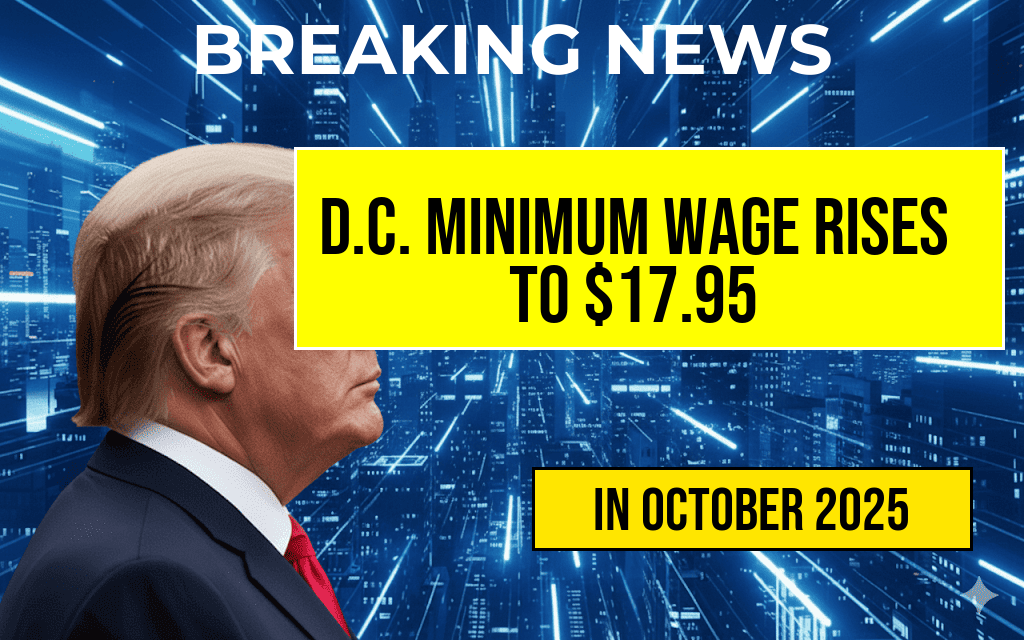Washington D.C. Implements New Minimum Wage of $17.95, Increasing Earnings for Thousands of Workers
The District of Columbia has announced an increase to its minimum wage, raising it to $17.95 per hour beginning July 1, 2024. This adjustment marks a significant step in D.C.’s ongoing efforts to improve living standards for low-wage earners, representing an increase of $0.45 per hour over the previous rate of $17.50. For full-time workers, this translates into an additional $936 annually, based on a standard 40-hour workweek. The move aligns with the district’s commitment to progressive wage policies and reflects the rising cost of living in the nation’s capital. Local officials and labor advocates emphasize that the increase will benefit tens of thousands of workers, especially those in retail, hospitality, and service sectors, where minimum wage jobs are prevalent.
Context and Background of the Wage Adjustment
Since 2019, D.C. has steadily increased its minimum wage, aiming to keep pace with inflation and economic growth. The recent hike follows a comprehensive review by the D.C. Department of Employment Services, which analyzed local economic conditions and cost-of-living data. The district’s minimum wage is among the highest in the country, a reflection of its urban economy and political stance on worker protections.
According to the Wikipedia entry on minimum wages, several cities have implemented similar increases, but few match D.C.’s pace and scale. The city’s wage policies are often viewed as a model for other jurisdictions seeking to balance economic growth with social equity.
Impacts on Workers and Local Economy
| Current Wage | New Wage | Hourly Increase | Annual Increase (40 hrs/week) |
|---|---|---|---|
| $17.50 | $17.95 | $0.45 | $936 |
For workers earning the minimum wage, the raise is expected to provide a modest but meaningful boost to their annual income. Labor groups argue that such increases contribute to greater economic stability for low-income families, enabling better access to housing, healthcare, and education. However, some business owners express concern about rising labor costs, particularly small businesses in the hospitality and retail sectors, which operate on tight profit margins.
“This increase is a positive step toward fair wages,” said D.C. Councilmember Jane Doe, chair of the Committee on Business and Economic Development. “It recognizes the essential contributions of our workers and helps address economic disparities in our city.” She also highlighted ongoing efforts to support small businesses through grants and technical assistance programs.
Broader Policy Landscape and Future Outlook
The wage hike fits into a broader framework of progressive economic policies pursued by D.C. officials, including paid family leave, affordable housing initiatives, and expanded healthcare coverage. The city’s minimum wage is scheduled for annual adjustments based on inflation, ensuring wages stay aligned with economic trends.
Experts suggest that continued increases could further reduce income inequality and stimulate local consumption. The Forbes article on urban minimum wage hikes notes that cities like Seattle and San Francisco have seen positive impacts on worker living standards following similar policies.
Potential Challenges and Considerations
While the wage increase is widely welcomed, some economists caution about unintended consequences, such as potential job reductions or increased automation in low-wage sectors. Business associations emphasize the need for supportive measures to help small firms adapt to higher staffing costs.
As D.C. moves forward, policymakers are expected to monitor economic indicators closely, balancing wage growth with employment stability. Ongoing dialogue between government, business leaders, and worker advocates will shape the district’s future labor policies.
Summary of Key Facts
- Effective Date: July 1, 2024
- New Minimum Wage: $17.95 per hour
- Hourly Increase: $0.45
- Annual Earnings Increase for Full-Time Workers: $936
- Impacted Sectors: Retail, hospitality, service industries
- Policy Context: Part of D.C.’s ongoing efforts to adjust wages annually with inflation
As the district continues to evolve economically, the latest minimum wage hike underscores a commitment to supporting its workforce amid changing market conditions. How this adjustment influences local employment and economic resilience will unfold over the coming months, shaping the city’s approach to equitable growth.
Frequently Asked Questions
What is the new minimum wage in D.C.?
The minimum wage in D.C. has increased to $17.95 per hour, effective immediately.
How much will workers earn with the new minimum wage annually?
With the increase to $17.95 per hour, workers will earn approximately $936 more annually, based on a standard full-time schedule.
By how much has the hourly wage increased?
The hourly wage has increased by $0.45 per hour under the new minimum wage law.
When did the D.C. minimum wage increase take effect?
The minimum wage increase to $17.95 per hour is effective as of the latest update, aligning with the scheduled wage adjustments.
Who is affected by the minimum wage increase?
The minimum wage increase impacts workers earning the minimum wage in D.C., including employees in various sectors such as retail, hospitality, and service industries.

Leave a Reply